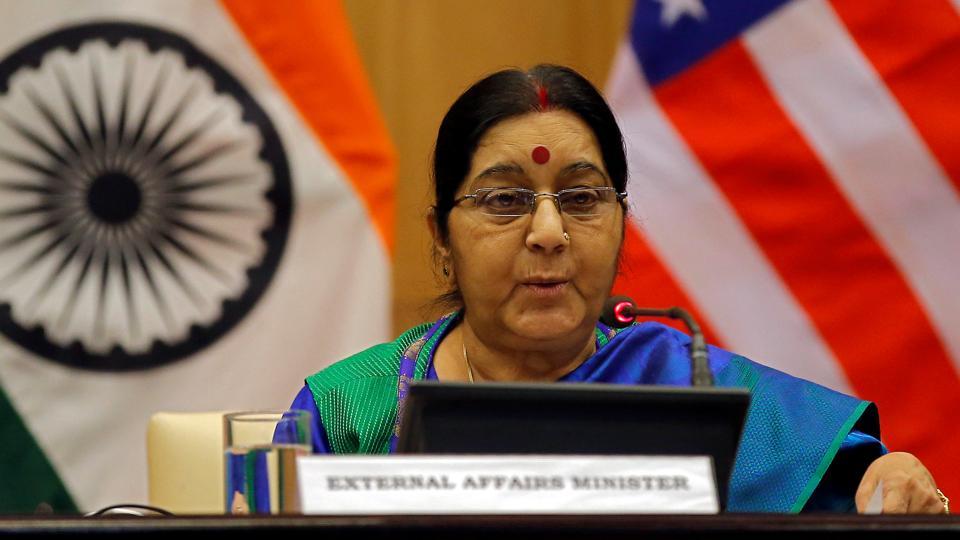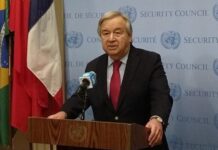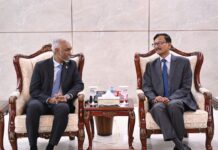 India Post News Service
India Post News Service
BISHKEK (Kyrgyzstan): India has said that it is now more determined to fight the scourge of terrorism following the attacks on security personnel at Pulwama in Jammu and Kashmir in February and those on churches and hotels in Sri Lanka on Easter Sunday.
“Our heart goes out to our brothers and sisters of Sri Lanka, who have recently witnessed the ghastly act of terrorism,” External Affairs Minister Sushma Swaraj said while addressing a meeting of the Shanghai Cooperation Organization (SCO) Council of Foreign Ministers here MAY 22.
“Our wounds of Pulwama attack were still raw and the news from the neighborhood has made us more determined to fight firmly resolutely against this menace,” she said.
“We are determined to consistently strengthen cooperation within the SCO framework for comprehensive, cooperative and sustainable security,” she stated as Pakistan Foreign Minister Shah Mehmood Qureshi watched.
Nine suicide bombers carried out a series of devastating blasts that tore through three churches and as many luxury hotels in Sri Lanka April 21, killing more than 250 people and injuring 500 others. The Islamic State terror group claimed the attacks, but the government blamed the local Islamist extremist group National Thawheed Jammath (NTJ) for the Ester Sunday bombings.
The attack came months after India witnessed a suicide attack by Pakistan-based Jaish-e-Mohammed on CRPF personnel in Pulwama district of Jammu and Kashmir, killing 40 soldiers.
Sushma Swaraj said that India was open to ideas on how to make the work of SCO’s Regional Anti-Terrorism Architecture (RATS) more effective in this regard.
The SCO is a Eurasian inter-governmental organization, the creation of which was announced in 2001 in Shanghai by Kazakhstan, China, Kyrgyzstan, Russia, Tajikistan and Uzbekistan. It was preceded by the Shanghai Five mechanism. India, along with Pakistan, was granted full membership of the bloc in 2017.
Sushma Swaraj also said that India was committed to any process, which can help Afghanistan emerge as a united, peaceful, secure, stable, inclusive and economically vibrant nation, with guaranteed gender and human rights.
“I wish to once again underscore the importance India attaches to SCO Afghanistan Contact Group and welcome an early conclusion of the draft oadmap of further actions of the Contact Group,” she said
Calling for a favorable economic environment among SCO member states, she said: “India is committed to continue working for a favorable environment for SCO member countries’ economic activities and to intensify work on the relevant SCO documents dealing with economic and trade cooperation. India subscribes to a rule-based, transparent, non-discriminatory, open and inclusive multilateral trading system, centered around the World Trade Organization, and firmly opposes unilateralism and protectionism.”
Stating that science and technology-led innovation and the digital economy are would play an important role in the long-term inclusive and sustainable growth, she said that India has adopted a multi pronged welfare approach in development of human resources, promoting R&D and innovation, enhancing efficiency through digital services, and ensuring a secure cyber space.
Sushma Swarajn also called for people-to-people contacts between SCO member states, stating that tourism is one such catalyst.
“We can actively cooperate to promote it,” she said. “We are sincerely committed to the implementation of the SCO Joint Action Plan forthe development of cooperation in the field of tourism for 2019-2020.”
Stressing on the importance of regional connectivity, she cited India’s involvement in the development of the International North-South Transport Corridor (INSTC), Chabahar port in Iran, the Ashgabat Agreement and the India-Myanmar-Thailand Trilateral Highway.
The INSTC is a 7,200-km-long multi-modal network of ship, rail and road routes to move freight between India, Iran, Afghanistan, Armenia, Azerbaijan, Russia, Central Asia and Europe.
India, Iran and Afghanistan are jointly developing the Chabahar port in southeastern Iran which will be a key link in the INSTC.
Last year, India joined the Ashgabat Agreement which seeks to establish an international transport and transit corridor between Iran, Oman, Turkmenistan and Uzbekistan.
The India-Myanmar-Thailand Trilateral Highway is being developed to connect Moreh in the northeast Indian state of Manipur with Mae Sot in Thailand.
“We have also operationalized air freight corridors between Kabul and Kandahar and New Delhi and Mumbai in 2017,” Sushma Swaraj said.
“We welcome regional connectivity initiatives, that are inclusive, sustainable, transparent and respect the principles of sovereignty and territorial integrity,” she said in the presence of Chinese Foreign Minister Wang Yi.
India has refused to be a part of Chinese President Xi Jinping’s Belt and Road Initiative (BRI) since its key project, the China-Pakistan Economic Corridor (CPEC) passes through Pakistan-occupied Kashmir.
The External Affairs Minister also stressed on the efficacy of multilateralism in today’s world and the need for UN Security Council (UNSC) reforms
“India firmly believes in the efficacy of multilateralism and adherence to the principles of the United Nations Charter,” she said.
“It is imperative to have comprehensive reforms of the United Nations and its Security Council to make it more representative and effective.”
India is a part of the Group of Four (G4) that also includes Japan, Germany and Brazil, that is seeking permanent membership in an expanded UNSC.
On the environment front, Sushma Swaraj said that India is committed to the UN Framework Convention on Climate Change and the Paris Agreement on Combating Climate Change.
“We welcome the agreement reached at COP 24 of the UN Framework Convention on Climate Change (held in Latowice, Poland in December 2018),” she said.
She also said that India supported initiatives for capacity building, human resource development, and fostering greater interaction among the youth of the region.
“We are ready to share India’s expertise with other SCO Members in such fields as agriculture, medicine, information technology, space, finance and renewable energy,” Sushma Swaraj said.






